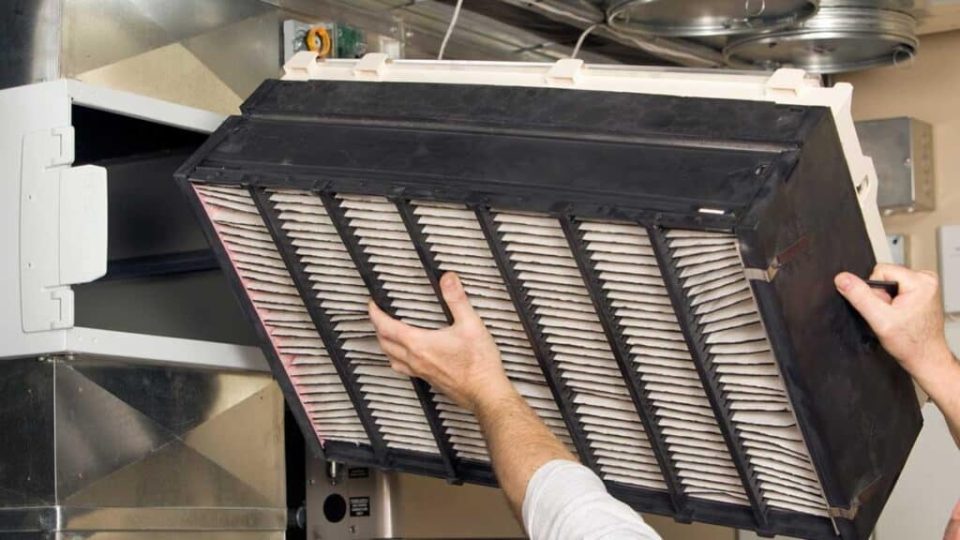In any home, the HVAC system plays a crucial role in maintaining comfort, whether it’s through heating during the winter or cooling in the summer. However, as homeowners, we often forget that the efficiency of these systems is greatly impacted by something as simple yet essential as the air filter. HVAC filters are the unsung heroes of our heating and cooling systems. They don’t just keep the air clean; they also help reduce energy costs and extend the lifespan of the system.
While the initial cost of HVAC filters may seem negligible, failing to properly maintain or replace them regularly can lead to inefficient performance and higher utility bills. This article will explore how selecting the right filter and using it effectively can lead to significant cost savings in both energy consumption and maintenance. By understanding the connection between air quality, system efficiency, and energy use, homeowners can make more informed choices that benefit both their wallet and the longevity of their HVAC system.
1. Improved Airflow Equals Improved Efficiency
One of the primary functions of an HVAC filter is to maintain smooth airflow throughout the system. When a filter becomes clogged with dirt, dust, and debris, it restricts the airflow, causing the HVAC system to work harder to heat or cool the home. This strain results in increased energy consumption. A well-maintained filter ensures that air can circulate freely, which allows the HVAC system to work at its optimal efficiency.
By using a clean, high-quality filter, the system doesn’t need to work as hard, leading to lower energy usage. If the filter is dirty, the system must push air through a restricted space, using more energy and increasing the wear and tear on the components. In this way, a clean filter can reduce overall energy consumption and lower monthly utility bills.
2. Choosing the Right Filter for Maximum Efficiency
Filters come in various types, sizes, and efficiency ratings, all of which affect the performance of your HVAC system. Some filters, such as fiberglass models, may be inexpensive but offer minimal filtration. On the other hand, high-efficiency particulate air (HEPA) filters capture smaller particles and offer superior air quality but are more expensive.
To strike a balance between cost and efficiency, it’s important to choose a filter that is appropriate for your home’s needs. MERV (Minimum Efficiency Reporting Value) ratings determine the effectiveness of an air filter in trapping particles. Filters with higher MERV ratings (ranging from 1 to 16) capture smaller and more numerous particles, improving air quality but also reducing airflow if not compatible with your system. A filter with a MERV rating between 7 and 12 is often optimal for residential use. These filters offer a good balance of air quality improvement without significantly hindering airflow.
By selecting the right filter, you ensure that your HVAC system operates efficiently, which reduces unnecessary energy expenditure.
3. Regular Filter Maintenance Reduces Repair Costs
One of the most straightforward and cost-effective ways to extend the life of your HVAC system is by regularly maintaining the filters. Dirty filters put undue stress on the system, leading to problems such as frozen coils, overheating, and motor failure. These issues can result in costly repairs or even the need for a complete system replacement.
By replacing or cleaning the filter as recommended by the manufacturer—typically every 1 to 3 months depending on the type of filter and household conditions—you prevent these issues from arising. A simple act of maintenance can save you from expensive repair bills and keep your HVAC system running for many years without incident.
4. The Impact of Filter Quality on Indoor Air Quality
An often-overlooked benefit of HVAC filters is their ability to improve indoor air quality. Poor air quality can lead to a range of health issues, from allergies and asthma to respiratory infections. If you or anyone in your household suffers from allergies or respiratory issues, a high-quality filter can make a significant difference. Filters with higher MERV ratings can trap dust, pollen, pet dander, and even bacteria, which not only improves the air you breathe but also reduces the need for medical treatments or interventions.
While it’s true that high-quality filters can be more expensive upfront, the potential savings in health-related costs—such as doctor visits, medications, and even lost workdays—can be significant in the long run. Additionally, better air quality contributes to a more comfortable and productive living environment, which is invaluable for families and individuals.
5. Reducing HVAC System Wear and Tear
Your HVAC system is a significant investment, and ensuring that it lasts as long as possible is a priority. By using clean filters, you prevent the system from working harder than it needs to. When air filters are clogged, the system’s internal components, such as the fan and motor, are forced to work harder, increasing wear and tear. Over time, this leads to more frequent repairs, reduced lifespan, and ultimately a higher cost of ownership.
By maintaining a clean filter, you reduce this strain, thereby extending the life of your HVAC system. A system that operates efficiently without excess strain requires fewer repairs and replacements, which ultimately saves you money.
6. Minimizing the Need for Excessive HVAC Usage
Another indirect cost-saving benefit of a clean HVAC filter is the system’s ability to maintain a comfortable temperature with less effort. When filters are clean and airflow is not obstructed, the HVAC system can more easily regulate the temperature in your home, meaning it doesn’t have to work as hard to reach your desired comfort level.
In contrast, a clogged filter forces the system to work harder, often leading to inconsistent temperatures and higher energy use. When your system is running efficiently, you are less likely to overuse heating or cooling. This reduction in unnecessary usage can lower your utility bills significantly over time.
7. Utilizing Smart Thermostats for Optimal Performance
Pairing high-quality filters with modern technology like smart thermostats can further enhance the efficiency of your HVAC system. Smart thermostats allow you to set schedules for when your HVAC system operates, ensuring that it runs only when necessary. Additionally, some smart thermostats come with air quality sensors that track the performance of your system’s filter.
By monitoring filter status and adjusting settings accordingly, a smart thermostat can help optimize both energy use and indoor air quality. The combination of high-efficiency filters and smart technology creates a synergy that reduces energy consumption and saves you money.
8. Enhanced System Performance with Proper Filter Sizing
One of the most common mistakes homeowners make when it comes to filters is selecting the wrong size for their HVAC system. A filter that is too small can allow dust and debris to bypass the filter, which leads to contamination of the air and clogging of the system’s internal components. A filter that is too large may restrict airflow and reduce the overall efficiency of the HVAC system.
To maximize the cost-saving potential of filters, it is essential to ensure the correct size for your HVAC system. Consult your system’s manual or ask an HVAC professional for guidance on the appropriate filter size. A well-sized filter will improve airflow, reduce system strain, and increase the efficiency of the unit.
9. Choosing Washable Filters for Long-Term Savings
For some homeowners, opting for washable, reusable filters can be a cost-effective choice over time. While these filters may have a higher upfront cost, they can be cleaned and reused indefinitely, eliminating the need to purchase disposable filters regularly. However, it’s essential to ensure that these filters are cleaned properly and frequently to maintain their effectiveness.
For households that want to reduce waste while still saving money on recurring filter costs, washable filters offer an appealing option. Just be sure to follow the manufacturer’s cleaning guidelines to prevent clogging and maintain optimal air quality.
10. Monitor and Adjust for Seasonal Changes
Finally, it’s important to adjust your HVAC filters based on the seasons. For instance, during spring and fall, when outdoor allergens like pollen and dust are high, you might consider using filters with higher MERV ratings to capture these particles. During the winter and summer, when the air tends to be drier, regular filter replacements will help maintain efficient airflow.
By aligning filter maintenance with seasonal needs, you can ensure optimal air quality and HVAC efficiency throughout the year. This proactive approach helps minimize energy waste and keeps your system running smoothly.
Conclusion
HVAC filters are more than just a component of your system—they are a critical part of ensuring efficient performance, maintaining air quality, and saving money. Regular maintenance, choosing the right filter, and understanding the role of filters in overall system function can help homeowners optimize their HVAC systems for both performance and cost savings. By following these cost-saving secrets, you’ll not only reduce your energy bills but also prolong the lifespan of your HVAC system and create a healthier, more comfortable living environment for your family.

